一般过去时的各种句型
- 格式:ppt
- 大小:456.00 KB
- 文档页数:12
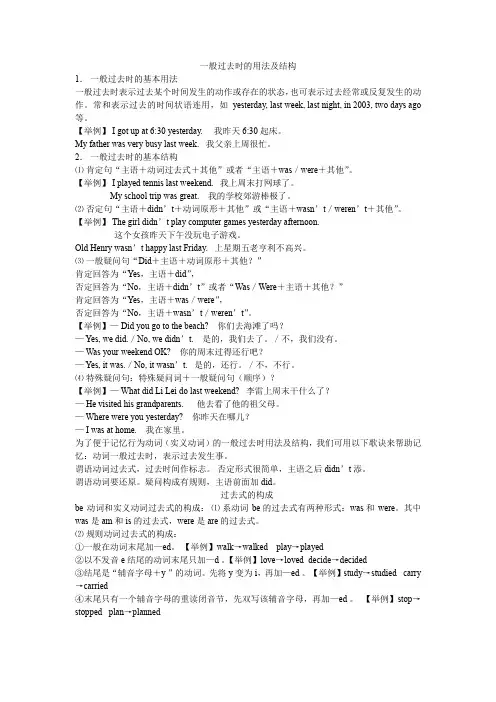
一般过去时的用法及结构1.一般过去时的基本用法一般过去时表示过去某个时间发生的动作或存在的状态,也可表示过去经常或反复发生的动作。
常和表示过去的时间状语连用,如yesterday, last week, last night, in 2003, two days ago 等。
【举例】 I got up at 6:30 yesterday. 我昨天6:30起床。
My father was very busy last week. 我父亲上周很忙。
2.一般过去时的基本结构⑴肯定句“主语+动词过去式+其他”或者“主语+was/were+其他”。
【举例】 I played tennis last weekend. 我上周末打网球了。
My school trip was great. 我的学校郊游棒极了。
⑵否定句“主语+didn’t+动词原形+其他”或“主语+wasn’t/weren’t+其他”。
【举例】 The girl didn’t play computer games yesterday afternoon.这个女孩昨天下午没玩电子游戏。
Old Henry wasn’t happy last Friday. 上星期五老亨利不高兴。
⑶一般疑问句“Did+主语+动词原形+其他?”肯定回答为“Yes,主语+did”,否定回答为“No,主语+didn’t”或者“Was/Were+主语+其他?”肯定回答为“Yes,主语+was/were”,否定回答为“No,主语+wasn’t/weren’t”。
【举例】— Did you go to the beach? 你们去海滩了吗?— Yes, we did./No, we didn’t. 是的,我们去了。
/不,我们没有。
— Was your weekend OK? 你的周末过得还行吧?— Yes, it was./No, it wasn’t. 是的,还行。
/不,不行。
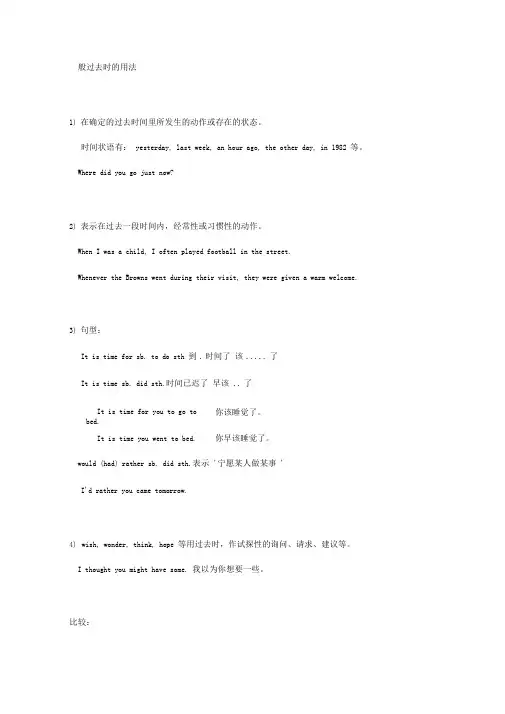
般过去时的用法1)在确定的过去时间里所发生的动作或存在的状态。
时间状语有:yesterday, last week, an hour ago, the other day, in 1982 等。
Where did you go just now?2)表示在过去一段时间内,经常性或习惯性的动作。
When I was a child, I often played football in the street.Whenever the Browns went during their visit, they were given a warm welcome.3)句型:It is time for sb. to do sth 到. 时间了该..... 了It is time sb. did sth.时间已迟了早该 .. 了It is time for you to go to你该睡觉了。
bed.It is time you went to bed. 你早该睡觉了。
would (had) rather sb. did sth. 表示'宁愿某人做某事'I'd rather you came tomorrow.4)wish, wonder, think, hope 等用过去时,作试探性的询问、请求、建议等。
I thought you might have some. 我以为你想要一些。
比较:一般过去时表示的动作或状态都已成为过去,现已不复存在。
Christine was an invalid all her life.(含义:她已不在人间。
)Christine has been an invalid all her life.(含义:她现在还活着)Mrs. Darby lived in Kentucky for seven years.(含义:达比太太已不再住在肯塔基州。
)Mrs. Darby has lived in Kentucky for seven years.(含义:现在还住在肯塔基州,有可能指刚离去)注意:用过去时表示现在,表示委婉语气。
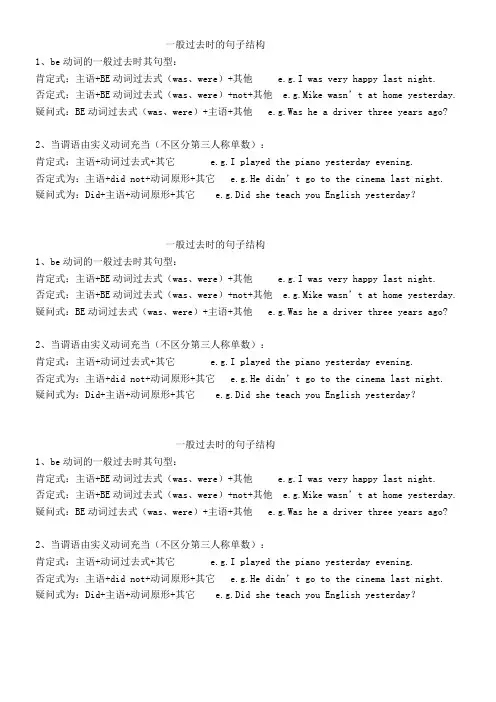
一般过去时的句子结构1、be动词的一般过去时其句型:肯定式:主语+BE动词过去式(was、were)+其他 e.g.I was very happy last night.否定式:主语+BE动词过去式(was、were)+not+其他 e.g.Mike wasn’t at home yesterday. 疑问式:BE动词过去式(was、were)+主语+其他 e.g.Was he a driver three years ago?2、当谓语由实义动词充当(不区分第三人称单数):肯定式:主语+动词过去式+其它 e.g.I played the piano yesterday evening.否定式为:主语+did not+动词原形+其它 e.g.He didn’t go to the cinema last night.疑问式为:Did+主语+动词原形+其它 e.g.Did she teach you English yesterday?一般过去时的句子结构1、be动词的一般过去时其句型:肯定式:主语+BE动词过去式(was、were)+其他 e.g.I was very happy last night.否定式:主语+BE动词过去式(was、were)+not+其他 e.g.Mike wasn’t at home yesterday. 疑问式:BE动词过去式(was、were)+主语+其他 e.g.Was he a driver three years ago?2、当谓语由实义动词充当(不区分第三人称单数):肯定式:主语+动词过去式+其它 e.g.I played the piano yesterday evening.否定式为:主语+did not+动词原形+其它 e.g.He didn’t go to the cinema last night.疑问式为:Did+主语+动词原形+其它 e.g.Did she teach you English yesterday?一般过去时的句子结构1、be动词的一般过去时其句型:肯定式:主语+BE动词过去式(was、were)+其他 e.g.I was very happy last night.否定式:主语+BE动词过去式(was、were)+not+其他 e.g.Mike wasn’t at home yesterday. 疑问式:BE动词过去式(was、were)+主语+其他 e.g.Was he a driver three years ago?2、当谓语由实义动词充当(不区分第三人称单数):肯定式:主语+动词过去式+其它 e.g.I played the piano yesterday evening.否定式为:主语+did not+动词原形+其它 e.g.He didn’t go to the cinema last night.疑问式为:Did+主语+动词原形+其它 e.g.Did she teach you English yesterday?。
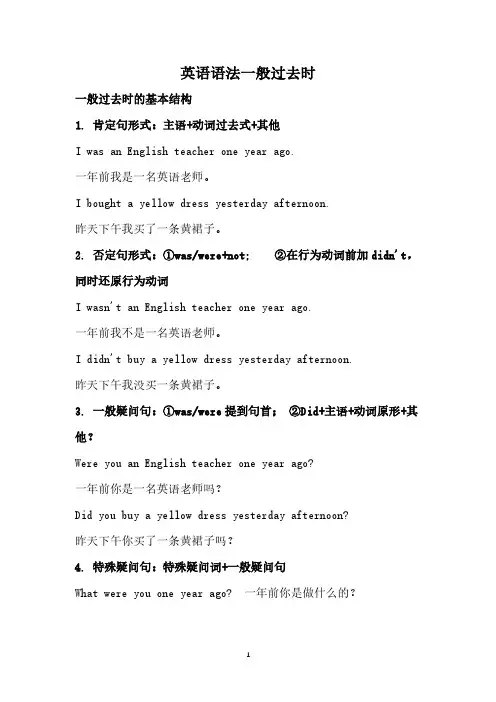
英语语法一般过去时一般过去时的基本结构1. 肯定句形式:主语+动词过去式+其他I was an English teacher one year ago.一年前我是一名英语老师。
I bought a yellow dress yesterday afternoon.昨天下午我买了一条黄裙子。
2. 否定句形式:①was/were+not; ②在行为动词前加didn't,同时还原行为动词I wasn't an English teacher one year ago.一年前我不是一名英语老师。
I didn't buy a yellow dress yesterday afternoon.昨天下午我没买一条黄裙子。
3. 一般疑问句:①was/were提到句首;②Did+主语+动词原形+其他?Were you an English teacher one year ago?一年前你是一名英语老师吗?Did you buy a yellow dress yesterday afternoon?昨天下午你买了一条黄裙子吗?4. 特殊疑问句:特殊疑问词+一般疑问句What were you one year ago? 一年前你是做什么的?When did you buy a yellow dress? 你什么时候买了一条黄裙子?一般过去时的基本用法1. 表示在过去某个时间所发生的动作或所处的状态(与现在无关)。
常与yesterday, last week, in 1989, just now, a moment ago, the other day等过去具体时间状语连用。
He was here just now. 他刚才还在这里。
What did you do yesterday? 你昨天做了什么事?2. 在过去一段时间内的经常性或习惯性动作。
We often played together when we were children.我们小时候常在一起玩。
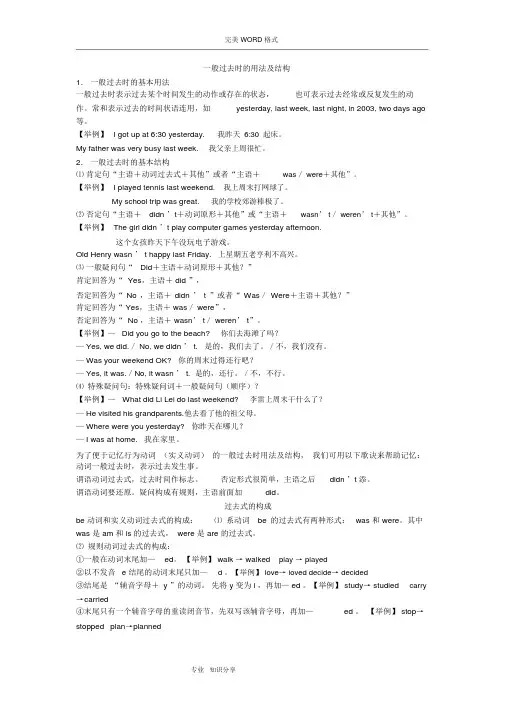
完美 WORD 格式一般过去时的用法及结构1.一般过去时的基本用法一般过去时表示过去某个时间发生的动作或存在的状态,也可表示过去经常或反复发生的动作。
常和表示过去的时间状语连用,如yesterday, last week, last night, in 2003, two days ago 等。
【举例】I got up at 6:30 yesterday.我昨天6:30起床。
My father was very busy last week.我父亲上周很忙。
2.一般过去时的基本结构⑴肯定句“主语+动词过去式+其他”或者“主语+was/ were+其他”。
【举例】I played tennis last weekend.我上周末打网球了。
My school trip was great.我的学校郊游棒极了。
⑵否定句“主语+didn ’t+动词原形+其他”或“主语+wasn’ t/ weren’ t+其他”。
【举例】The girl didn ’t play computer games yesterday afternoon.这个女孩昨天下午没玩电子游戏。
Old Henry wasn ’ t happy last Friday.上星期五老亨利不高兴。
⑶一般疑问句“Did+主语+动词原形+其他?”肯定回答为“ Yes,主语+ did ”,否定回答为“No ,主语+didn ’ t ”或者“ Was/ Were+主语+其他?”肯定回答为“ Yes,主语+ was/ were”,否定回答为“ No ,主语+ wasn’ t/ weren’ t”。
【举例】—Did you go to the beach?你们去海滩了吗?— Yes, we did./ No, we didn ’ t. 是的,我们去了。
/不,我们没有。
— Was your weekend OK? 你的周末过得还行吧?— Yes, it was./No, it wasn ’ t. 是的,还行。
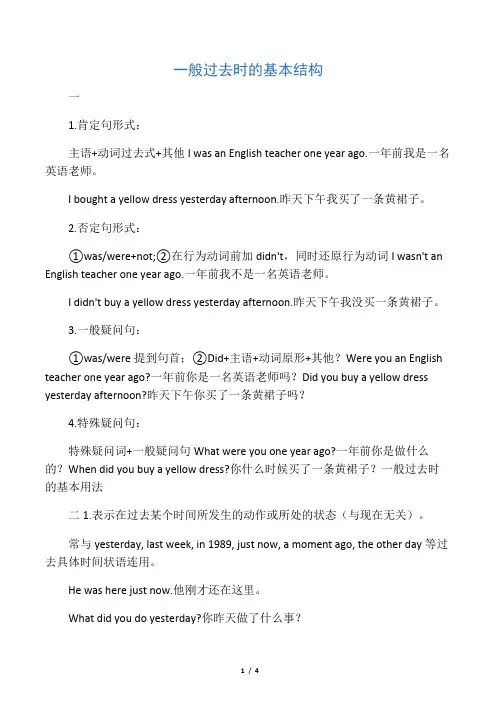
一般过去时的基本结构一1.肯定句形式:主语+动词过去式+其他I was an English teacher one year ago.一年前我是一名英语老师。
I bought a yellow dress yesterday afternoon.昨天下午我买了一条黄裙子。
2.否定句形式:①was/were+not;②在行为动词前加didn't,同时还原行为动词I wasn't an English teacher one year ago.一年前我不是一名英语老师。
I didn't buy a yellow dress yesterday afternoon.昨天下午我没买一条黄裙子。
3.一般疑问句:①was/were提到句首;②Did+主语+动词原形+其他?Were you an English teacher one year ago?一年前你是一名英语老师吗?Did you buy a yellow dress yesterday afternoon?昨天下午你买了一条黄裙子吗?4.特殊疑问句:特殊疑问词+一般疑问句What were you one year ago?一年前你是做什么的?When did you buy a yellow dress?你什么时候买了一条黄裙子?一般过去时的基本用法二1.表示在过去某个时间所发生的动作或所处的状态(与现在无关)。
常与yesterday, last week, in 1989, just now, a moment ago, the other day等过去具体时间状语连用。
He was here just now.他刚才还在这里。
What did you do yesterday?你昨天做了什么事?2.在过去一段时间内的经常性或习惯性动作。
We often played together when we were children.我们小时候常在一起玩。
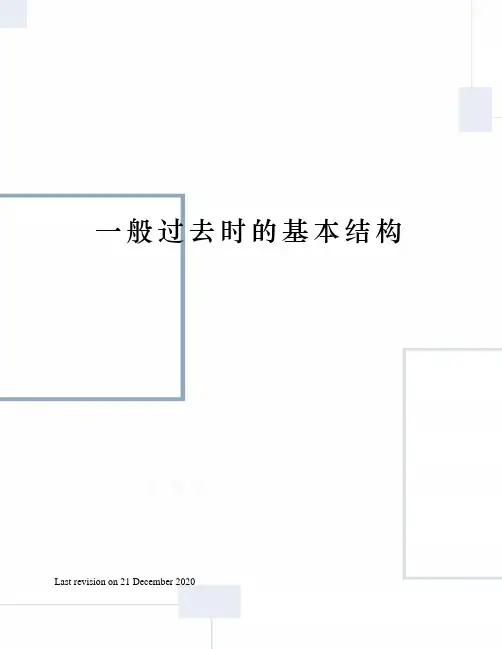
一般过去时的基本结构Last revision on 21 December 2020一般过去时的基本结构一1. 肯定句形式:主语+动词过去式+其他I was an English teacher one year ago.一年前我是一名英语老师。
I bought a yellow dress yesterday afternoon.昨天下午我买了一条黄裙子。
2. 否定句形式:①was/were+not; ②在行为动词前加didn't,同时还原行为动词I wasn't an English teacher one year ago.一年前我不是一名英语老师。
I didn't buy a yellow dress yesterday afternoon.昨天下午我没买一条黄裙子。
3. 一般疑问句:①was/were提到句首;②Did+主语+动词原形+其他Were you an English teacher one year ago一年前你是一名英语老师吗Did you buy a yellow dress yesterday afternoon昨天下午你买了一条黄裙子吗4. 特殊疑问句:特殊疑问词+一般疑问句What were you one year ago一年前你是做什么的When did you buy a yellow dress你什么时候买了一条黄裙子一般过去时的基本用法二1. 表示在过去某个时间所发生的动作或所处的状态(与现在无关)。
常与yesterday, last week, in 1989, just now, a moment ago, the other day等过去具体时间状语连用。
He was here just now.他刚才还在这里。
What did you do yesterday你昨天做了什么事2. 在过去一段时间内的经常性或习惯性动作。
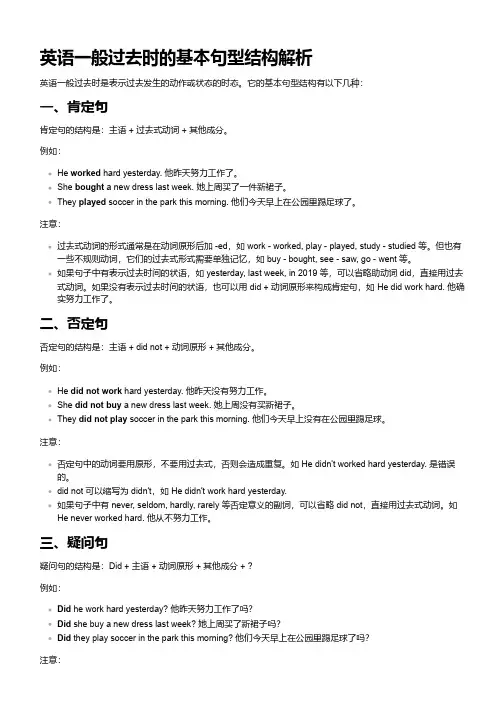
英语一般过去时的基本句型结构解析英语一般过去时是表示过去发生的动作或状态的时态。
它的基本句型结构有以下几种:一、肯定句肯定句的结构是:主语 + 过去式动词 + 其他成分。
例如:He worked hard yesterday. 他昨天努力工作了。
She bought a new dress last week. 她上周买了一件新裙子。
They played soccer in the park this morning. 他们今天早上在公园里踢足球了。
注意:过去式动词的形式通常是在动词原形后加 -ed,如 work - worked, play - played, study - studied 等。
但也有一些不规则动词,它们的过去式形式需要单独记忆,如 buy - bought, see - saw, go - went 等。
如果句子中有表示过去时间的状语,如 yesterday, last week, in 2019 等,可以省略助动词 did,直接用过去式动词。
如果没有表示过去时间的状语,也可以用 did + 动词原形来构成肯定句,如 He did work hard. 他确实努力工作了。
二、否定句否定句的结构是:主语 + did not + 动词原形 + 其他成分。
例如:He did not work hard yesterday. 他昨天没有努力工作。
She did not buy a new dress last week. 她上周没有买新裙子。
They did not play soccer in the park this morning. 他们今天早上没有在公园里踢足球。
注意:否定句中的动词要用原形,不要用过去式,否则会造成重复。
如 He didn't worked hard yesterday. 是错误的。
did not 可以缩写为 didn't,如 He didn't work hard yesterday.如果句子中有 never, seldom, hardly, rarely 等否定意义的副词,可以省略 did not,直接用过去式动词。
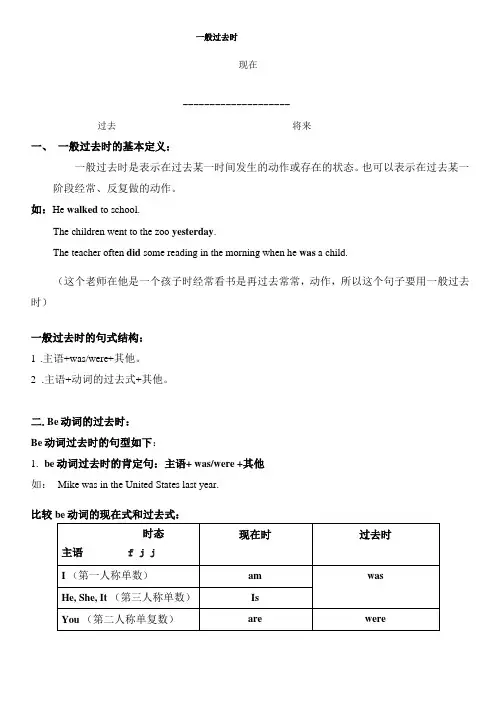
一般过去时现在--------------------过去将来一、一般过去时的基本定义:一般过去时是表示在过去某一时间发生的动作或存在的状态。
也可以表示在过去某一阶段经常、反复做的动作。
如:He walked to school.The children went to the zoo yesterday.The teacher often did some reading in the morning when he was a child.(这个老师在他是一个孩子时经常看书是再过去常常,动作,所以这个句子要用一般过去时)一般过去时的句式结构:1.主语+was/were+其他。
2.主语+动词的过去式+其他。
二.Be动词的过去时:Be动词过去时的句型如下:1.be动词过去时的肯定句:主语+ was/were +其他如:Mike was in the United States last year.比较be动词的现在式和过去式:如:I was very tired last night.You were absent from school two days ago.There were some books there. (那儿曾经有一些书。
)注意:There be句型用于一般过去时需把is /are变为它们的过去式:There was (were)…2.Be动词过去时的否定句:主语+ was/were + not +其他He was not in Canada last year.Be过去式的否定句结构,只要在was/were后面加上not就可以了。
它的缩写形式为:wasn't和weren't如:I wasn't busy yesterday.There weren’t any boys in the room.3.Be动词过去时的疑问句:(1)was/were +主语+其他(一般疑问句)--- W as it raining in Beijing yesterday?--- N o, it wasn't. It was cloudy.(2)特殊疑问词+ were/was +主语+其他(特殊疑问句)--- W here were you yesterday morning?--- I was at school.Be动词过去式一般疑问句的结构,只要把was/were提到主语前面,some变any , and变成or.回答时,Yes,…was/were.No,…wasn't/weren't.以疑问词开始的特殊疑问句,回答时,不能用Yes, No.直接回答所问的问题即可。
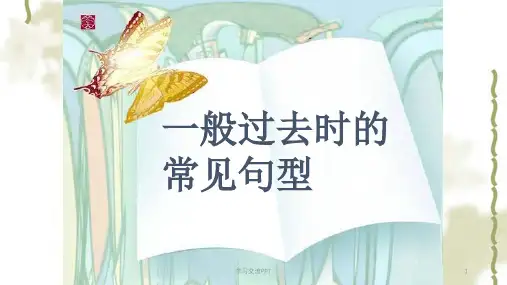
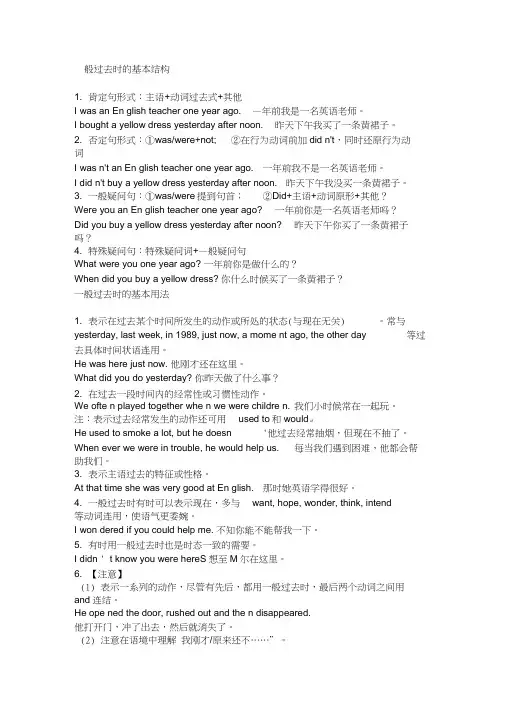
般过去时的基本结构1. 肯定句形式:主语+动词过去式+其他I was an En glish teacher one year ago. —年前我是一名英语老师。
I bought a yellow dress yesterday after noon. 昨天下午我买了一条黄裙子。
2. 否定句形式:①was/were+not; ②在行为动词前加did n't,同时还原行为动词I was n't an En glish teacher one year ago. 一年前我不是一名英语老师。
I did n't buy a yellow dress yesterday after noon. 昨天下午我没买一条黄裙子。
3. 一般疑问句:①was/were提到句首;②Did+主语+动词原形+其他?Were you an En glish teacher one year ago? 一年前你是一名英语老师吗?Did you buy a yellow dress yesterday after noon? 昨天下午你买了一条黄裙子吗?4. 特殊疑问句:特殊疑问词+—般疑问句What were you one year ago? 一年前你是做什么的?When did you buy a yellow dress? 你什么时候买了一条黄裙子?一般过去时的基本用法1. 表示在过去某个时间所发生的动作或所处的状态(与现在无关) 。
常与yesterday, last week, in 1989, just now, a mome nt ago, the other day 等过去具体时间状语连用。
He was here just now. 他刚才还在这里。
What did you do yesterday? 你昨天做了什么事?2. 在过去一段时间内的经常性或习惯性动作。
We ofte n played together whe n we were childre n. 我们小时候常在一起玩。
一般过去时的用法及结构1.一般过去时的基本用法一般过去时表示过去某个时间发生的动作或存在的状态,也可表示过去经常或反复发生的动作。
常和表示过去的时间状语连用,如yesterday, last week, last night, in 2003, two days ago 等。
【举例】 I got up at 6:30 yesterday. 我昨天6:30起床。
My father was very busy last week. 我父亲上周很忙。
2.一般过去时的基本结构⑴肯定句“主语+动词过去式+其他”或者“主语+was/were+其他”。
【举例】 I played tennis last weekend. 我上周末打网球了。
My school trip was great. 我的学校郊游棒极了。
⑵否定句“主语+didn’t+动词原形+其他”或“主语+wasn’t/weren’t+其他”。
【举例】 The girl didn’t play computer games yesterday afternoon.这个女孩昨天下午没玩电子游戏。
Old Henry wasn’t happy last Friday. 上星期五老亨利不高兴。
⑶一般疑问句“Did+主语+动词原形+其他?”肯定回答为“Yes,主语+did”,否定回答为“No,主语+didn’t”或者“Was/Were+主语+其他?”肯定回答为“Yes,主语+was/were”,否定回答为“No,主语+wasn’t/weren’t”。
【举例】— Did you go to the beach? 你们去海滩了吗?— Yes, we did./No, we didn’t. 是的,我们去了。
/不,我们没有。
— Was your weekend OK? 你的周末过得还行吧?— Yes, it was./No, it wasn’t. 是的,还行。
/不,不行。
一般过去时的句子》一般过去时的句子(一):1 、你没尽自已最大努力去做这件事。
You didnt do your best to do it2 、他已经拜访亲戚了。
He visited relatives before 。
3 、我昨晚很疲劳。
I was very tired last night 。
4 、冰冰刚吃了点东西。
Bingbing ate sonmething before 。
5 、她什么时候上一年级?When was she in Grade ?6 、我昨日看电视了。
I watched TV yesterday 。
7 、我们昨日没在一齐。
We weren't together yesterday 。
8 、我以为你病了呢。
I thought you were ill 。
9 、她去年上年级。
She was in Gradelast year 。
10 、我们昨日在一齐。
We were together yesterday 。
11 、艾米早就上网了。
Amy surfed the net before 。
12 、他昨日很忙。
He was busy yesterday 。
13 、她以前跳舞。
She danced before 。
14 、那些日子他总是工作到深夜。
He always worked into night those days15 、上周他们在上海。
They were in Shanghai last week 。
16 、我不明白你在巴黎。
I didn''t know you were in Paris17 、你们什么时光在一齐?When were you together?18 、他昨日不忙。
He was not busy yesterday 。
19 、几分钟前他们还在那里。
They were here only a few minutes ago20 、上星期他们打过网球。
般过去时的用法及结构1 .—般过去时的基本用法一般过去时表示过去某个时间发生的动作或存在的状态,也可表示过去经常或反复发生的动作。
常和表示过去的时间状语连用,如yesterday, last week, last ni ght, i n 2003, two days ago 等。
【举例】I got up at 6:30 yesterday. 我昨天6:30起床。
My father was very busy last week. 我父亲上周很忙。
2. 一般过去时的基本结构⑴肯定句"主语+动词过去式+其他”或者"主语+ was/ were +其他”。
【举例】I played tenn is last weeke nd.我上周末打网球了。
My school trip was great. 我的学校郊游棒极了。
⑵否定句"主语+ didn' t +动词原形+其他”或"主语+ wasn' t/weren' t +其他”。
【举例】The girl did n ' t play computer games yesterday after noon.这个女孩昨天下午没玩电子游戏。
Old Henry wasn ' t happy last Friday.上星期五老亨利不高兴。
⑶一般疑冋句“ Did +主语+动词原形+其他?”肯定回答为“ Yes,主语+ did ”,否定回答为"No,主语+ didn' t”或者"Was/ Were +主语+其他?”肯定回答为"Yes,主语+ was/were”,否定回答为"No,主语+ wasn' t/weren' t”。
【举例】一Did you go to the beach? 你们去海滩了吗?—Yes, we did./ No, we didn ' t.是的,我们去了。
一般过去时知识点梳理总结一、一般过去时含义:表示动作发生在过去二、一般过去时的时间标志词:yesterday(昨天)、the day before yesterday(前天)、just now(刚刚)、this morning(今天早上)、in 2002(在2002年) ...ago(...之前):three days ago(三天前)、two weeks ago(两年前) last...(上一个...):last week(上一周),last month(上个月)in the past(在过去)三、一般过去时的句型:1.be动词(am的过去式:was;is的过去式:was are的过去式:were)1)肯定句:主语+be动词过去式...如:He was a teacher.他以前是一个老师。
They were teachers.他们以前是老师。
2)否定句:主语+be动词过去式+not...如:He wasn’t a teacher..他以前不是一个老师。
They weren’t teachers.他们以前不是老师。
3)一般疑问句:be动词过去式+主语...如:Was he a teacher?他以前是一个老师吗?Were they teachers?他们以前是老师吗?肯定回答:Yes,主语+be动词过去式。
如:Yes,he was.Yes,they were.否定回答:No,主语+be动词过去式+not.如:No,he wasn’t.No,they weren’t.3)特殊疑问句:特殊疑问词+be动词过去式+主语...如:What was he?他以前是干什么的?What were they?他们以前是干什么的?2.实义动词实义动词的否定句、疑问句需要借助助动词,(助动词do/does的过去式是did)1)肯定句:主语+动词过去式...如:I went to school yesterday.我昨天去学校了。